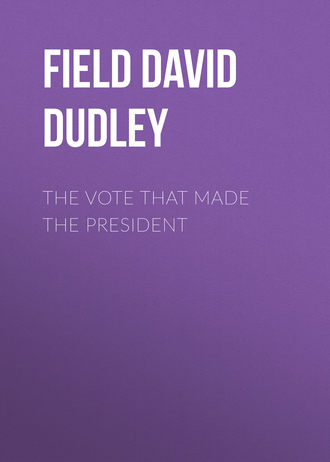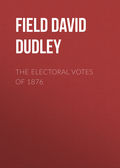
Field David Dudley
The Vote That Made the President
The Legal Question
As to the conclusiveness of the Governor's and canvassers' certificates. The doctrine of the majority of the Commission, and of the Senate, is, that the certificate of the Governor "on and according to the determination and declaration" of the State canvassers, cannot be shown to be false, though it may have been obtained by force or fraud. This doctrine admits that the truth of the Governor's certificate can be inquired into, else why the qualification that it must be "on and according to" the canvasser's certificate. It is said to be good only when in such accord; therefore, when not in accord, it is good for nothing. We may, then, dismiss the Governor's certificate as of no account, and to be left therefore out of further discussion. The substance of the doctrine is, that the certificate of the State canvassers cannot be contradicted.
This language must, of course, be understood, as used in reference to the question at that time depending; that is to say, whether evidence to contradict or annul the certificate was then and there admissible. It had already been decided in the Florida case that no action of the State authorities, after the electors had voted, could affect the validity of the vote. Whether such action before the vote would have been of any avail was not decided, and will never be decided, unless a radical change is made in the laws, since, according to present legislation, the vote of the electors treads fast on the heels of their appointment. In Florida, they were declared appointed at three o'clock in the morning, and they voted at twelve, just nine hours afterward. In Louisiana the interval was even less. To suppose that any State action would or could be had in such an interval, or in any interval possible under present laws, would be as wild as to suppose that counting in a President by fraud will not be followed by imitators at future elections.
Taking the doctrine, however, precisely as it was applied in the instance of Louisiana, it is this: that the certificate of State canvassers cannot be impeached by evidence showing either that they had no jurisdiction to canvass the electoral vote at all, or that they had no jurisdiction to throw away votes that were actually cast, inasmuch as the power to throw away came into existence only when affidavits were laid before them, and there were no affidavits except such as they had caused to be forged, which, in the eye of the law, were not affidavits at all.
One would say that such a doctrine, held up in its nakedness, need hardly be attacked, for no man, not maddened by the fanaticism of party, would be found willing to defend it; yet if not defended, the disposition of the Louisiana case must be pronounced as unsound in law as it was injurious in policy and offensive in morals. But I go further, and deny the conclusiveness of the canvassers' certificate under any circumstances. Suppose the question to be put thus: Can the certificate of State canvassers, acting within the scope of their authority, be questioned by evidence of mistake, fraud, or duress; what should be the answer? Most certainly it can, should be answered.
The statutes of the State may or may not have declared the effect of the certificate. In the case of Louisiana, this was the only statute relevant:
"The returns of the elections thus made and promulgated shall be prima-facie evidence in all courts of justice and before all civil officers, until set aside after a contest according to law, of the right of any person named therein to hold and exercise the office to which he shall by such return be declared elected."
Whatever doubt may have been expressed or felt whether this statute applied to the canvassers of a presidential election, or whether the words prima facie really meant prima facie, or whether "courts of justice," and "civil officers," included the Electoral Commission and the two Houses of Congress, there can be no doubt that "the returns of the elections thus made and promulgated" do not include returns canvassed without jurisdiction, or made under cover of pretended affidavits which the returning officers themselves caused to be forged.
But, passing from this view of the subject, although this is sufficient to dispose of Brewster's pretensions, let us suppose a stronger case – the strongest supposable – that of a State Legislature directing not only the manner in which electors shall be appointed, but directing also that the certificate of the State canvassers shall be conclusive evidence that the State has appointed in the manner directed.
Because the Constitution provides that electors shall be appointed by the State, in the manner directed by its Legislature, it is thence inferred that the State must furnish the evidence of the appointment, and of course that none can be received except that which the State has furnished. And this is said to be the true States-rights doctrine. It is a strange sight, that of gentlemen clamoring for State rights who will not allow the people of Louisiana and South Carolina to take care of themselves; who are even now debating at Washington whether they shall not order new elections in those States, or which of two State governments they shall put up and which put down, and who since the war have treated the South as if no States were there, parceling it into military districts, and denying recognition until constitutional amendments were ratified. Their assertion of the conclusiveness of false and fraudulent canvassers' certificates, on the pretense of upholding State rights, should seem to be thrown in our faces by way of bravado, unless it be meant, indeed, for burlesque masking hypocrisy. But if the sight were not strange, and those gentlemen had been all along as careful of the rights of the States as they are of their own places, there is nothing in the claim for the conclusiveness of canvassers' certificates which receives support from the doctrine of State rights. On the contrary, the rights of the States are best preserved by fencing them against force or fraud, by leaving them untrammeled in their own action, and leaving us untrammeled in finding out what that action has been. No rights are ever lost by letting in the light.
A certificate can be conclusive evidence of the States' action, only when the act and the certificate are identical. If the Constitution had provided that there should be sent from each State a certificate signed by such persons as the Legislature might designate, declaring who should cast the electoral votes, then the only inquiry that could have been made at Washington would have been, whether the certificate sent up was so signed and the persons therein mentioned had voted; but the Constitution has provided nothing of the kind. It has provided that the State shall appoint in the manner directed by its Legislature, and the inquiry thereupon to be made at the Capitol is, "Whom has the State appointed in the manner directed?"
We agree that the State has complete power, within certain limits regarding the persons who may be appointed, to appoint its electors in any manner its Legislature may direct, but whether the State has done so is open to inquiry. Canvassers of votes are not the State, or the Legislature of the State, and their certificate is nothing but evidence. Two facts are to be shown: one that the State has acted, and the other that the act has been in conformity to the directions of the Legislature. There is nothing in positive law, or in the reason of things, which, if the fact certified do not exist, requires that its falsity should not be open to proof.
The Electoral Commission and the Senate read the Constitution as if the words following in italics were part of it:



